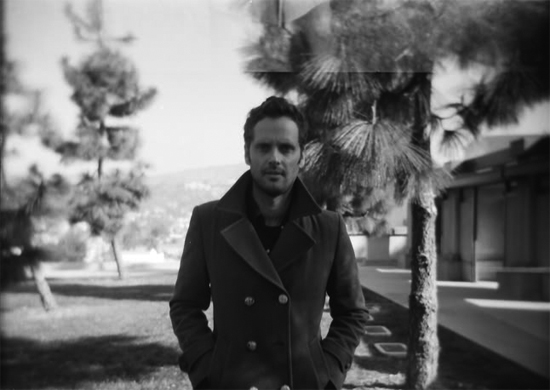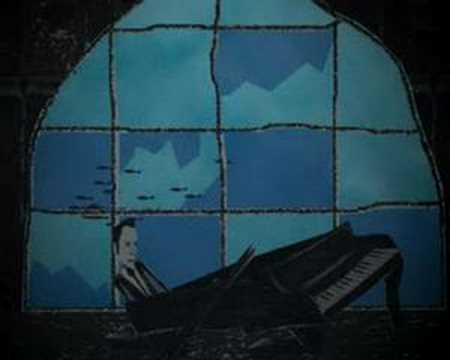Anyone looking for a little respite from the noise of 21st Century life has probably already stumbled upon Dustin O’Halloran, one half of the Bella Union-signed Devics. After a few years living in Italy and a prolonged break from his band’s work, O’Halloran now lives in Berlin, and since 2004 he’s released two volumes of skeletally beautiful solo piano instrumentals, as well as two further collections this year alone: Lumière, his first to feature extra, if still sparse, instrumentation, and a live solo recording, Vorleben. One of the most prominent members of the so called neo- or post-classical scene, alongside the likes of Nils Frahm, Ólafur Arnalds and Jóhann Jóhannsson, his music has been featured in Sofia Coppola’s Marie Antoinette, and he recently composed the score for Like Crazy, which picked up the Grand Jury Prize (Dramatic) at Sundance earlier this year. Two more soundtracks are currently in the works.
His latest project is a collaboration with Brussels-based Adam Wiltzie (of orchestral drone maestros Stars Of The Lid). Their forthcoming debut, recorded under the name A Winged Victory For The Sullen, is a breathtaking exercise in melody and mood that combines the romantic inclinations of O’Halloran’s piano compositions with the swooning, atmospheric soundscapes of Stars Of The Lid. Grand, epic, but at the same time beautifully understated, it’s arguably the best example so far of the way that he and his contemporaries are combining older traditions with modern technology and aesthetics.
"When people ask me what it sounds like," he laughs over coffee in his Kreuzberg studio, "I say it sounds like Adam and I, ‘cos that’s exactly what it sounds like!"
Your first commercially released music was with a band, Devics, but your solo work reveals a deep love for classical music such as Debussy, Chopin and Satie.
Dustin O’Halloran: I always loved this music, and even from the beginning of Devics I worked in private on the piano. My first instrument was the piano and my first love of music was classical, so I guess I’m just coming full circle.
What provoked you to move from Devics’ dream-pop to solo piano work?
DO’H: This was never a decided move. When I moved to Italy, it was the first time I had a chance to focus on it and actually record some pieces. Simon [Raymonde] at Bella Union Records heard it and asked me if I wanted to release it, and honestly I was hesitant in the beginning because I felt it was too personal and intimate. But in the end it was a good push he gave me.
Your latest album is a solo live recording from Berlin’s Grunewald Church, which is also where Nils Frahm recorded The Bells. Why did you choose this location?
DO’H: I never really intended to release a live album. It was just more of a case of the right recording at the right time. Nils was having his release concert there. And we actually set up all the microphones to record later after the show, for the project I have with Adam Wiltzie, A Winged Victory For The Sullen. As it turned out, the performance was all acoustic and went really well. Everyone was so quiet, and there was a special atmosphere that night. An hour before the concert, my mother called me to tell me my grandmother had passed away. So I dedicated the night to her, and I think this created a special atmosphere.
So how did A Winged Victory For The Sullen come about?
DO’H: Well, that was a collaboration that just evolved really naturally and slowly. We met at a Sparklehorse concert when I was living in Italy. He was playing with Sparklehorse and my friend, Francesco, an engineer who’s had a studio in Italy for a long time, introduced us. We shared music and became mutual fans, and then we had an idea about collaborating on one piece of music. And I sent it to him, and when it came back it was great, but I realised that there was something more that we could do if we were actually in the same place at the same time. So I said, ‘Why don’t you just come over for a couple of days and let’s just see what happens?’ And in two days we had the first five ideas that eventually sprouted this whole record. Even at the beginning we didn’t know what we were doing, if we were making a record or a few songs, but as we started getting into it we realised it was a record, and then as we got deeper into the record we realised it was more than one record.
Adam and I have such different ways to work, but we completely complement each other because we both can really let go of a lot of things. And that’s the nice thing, if you can collaborate with somebody where you can actually give the space to the other person for their ideas.
I think the making of this record was one of my favourite recording experiences, as we did it in some amazing and beautiful acoustic spaces. We began writing in Berlin and Brussels, where Adam lives, and also recorded in Grunewald Church, then did strings in Berlin’s old DDR radio studios. It was mixed in a 16th century villa in the Italian countryside, completely analogue to tape. The name is a reference to the statue in the Louvre, The Winged Victory of Samothrace. I think the music has this really neutral state, like floating in space, so we wanted to name it something with a sort of grand feeling.
Did you have any goals? Or did the whole thing emerge from just experimenting?
DO’H: I think the only thing we were really conscious of was just keeping things really minimal and clear. It’s really deliberate. Some songs even started from certain philosophical discussions and we really thought about it a lot, what we wanted to do, and the space we wanted to put in it. We didn’t want to make this sort of ‘jam’ record. I think a lot of electronic and piano records have been really improvised, which is nice, but we wanted to make something that was bringing those two worlds together but was really composed.
Where there any artists that to whom you wanted to culturally align yourselves?
DO’H: I guess maybe the obvious ones are Gorecki, Gavin Bryars, Brian Eno, Arvo Part…
There isn’t really a neo-classical record that doesn’t reference Gorecki or Arvo Part…!
DO’H: Yeah, but we also listen to a lot of film music. There’s soundtrack elements in there, and drone, and then obviously our own histories are in there as well. Both of us have been making records for a really long time. And I think that was one of the things [about] doing the record which was nice, because we both had been working on our own for so long. I think both of us were even maybe a little unsure if we could even write with somebody else, because we both have our own weird way of making music. But it just worked. We could both step away and we could both get into it. Adam and I could actually work pretty quickly because we could both look at the music objectively, and I think that if one of us felt really strongly about something we’d always leave space for that.
In general, do you think that there’s a growing interest in more peaceful music?
DO’H: I can only speak for myself. I think that part of the reason I like to work in this area is just because I think there’s so much rock music, so much music that’s so full of information, and some of it even feels like you’re getting sold something. And I think because of the way the internet’s grown so much in the last ten years, and the way communication is, and the way that advertising has hijacked the idea of cool, and the way that people are being sold things, and the way that the bands buy into it just as much as the fans… I think that whole idea just creates so much constant noise in everybody’s head, [so] to create space is just logical.
With my own solo work I’ve had the opportunity to do some straight acoustic concerts with no amplification. It was really beautiful to be able to do that in a time when everything’s always experienced through speakers or headphones, every musical experience is blasting in your ears. And just to have an acoustic experience, which is in some ways the most musical, because you’re hearing everything in the natural way. I think that’s important.



